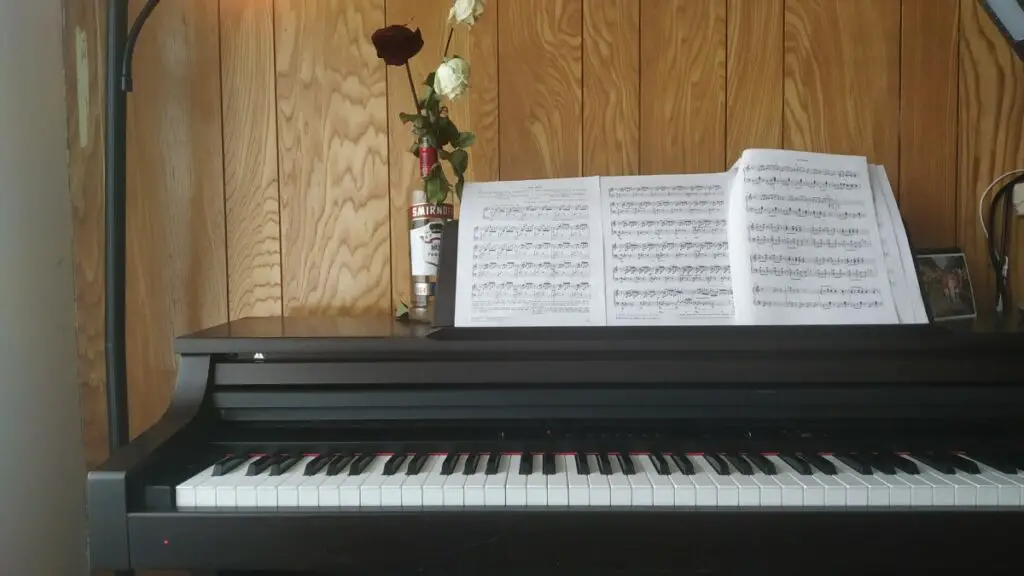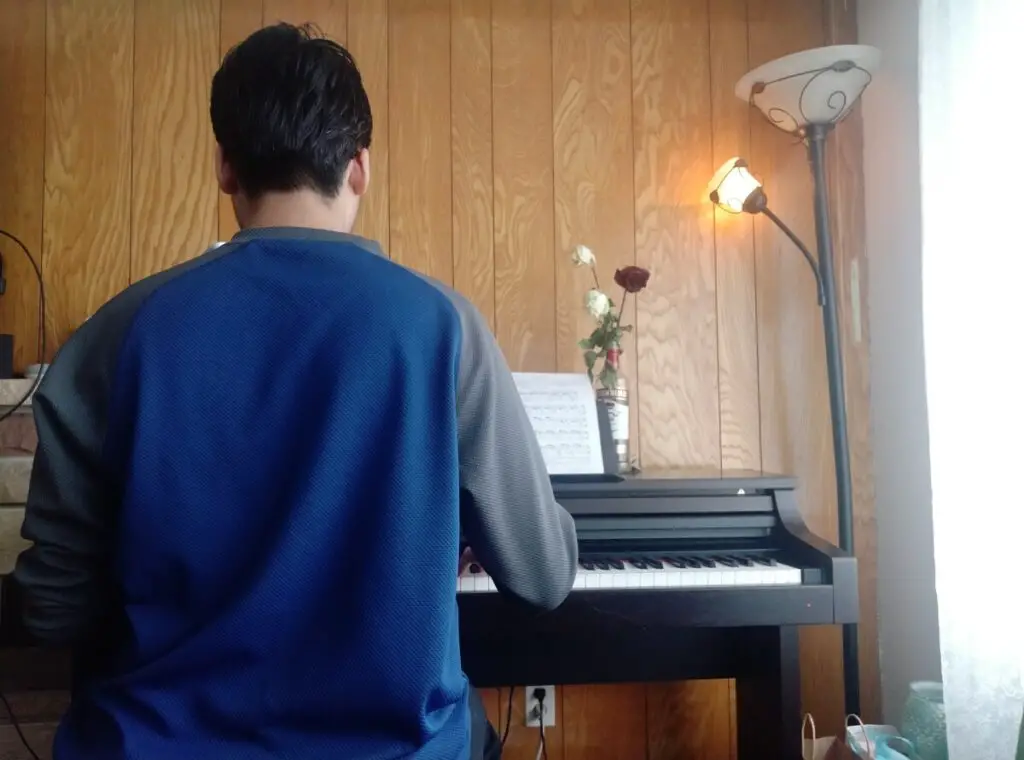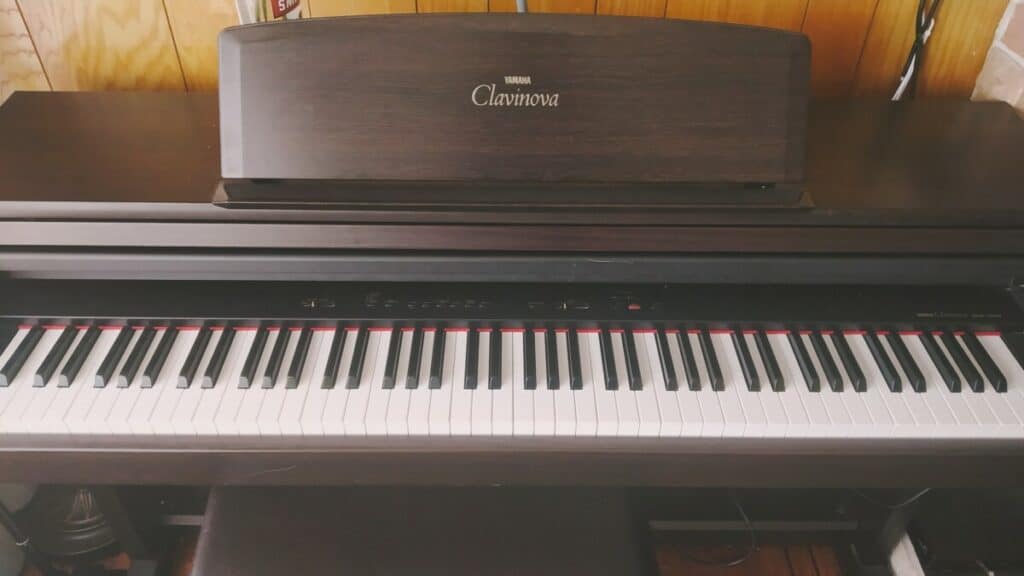This post contains affiliate links.

So you’ve decided to begin taking piano lessons, but are wondering if you need to immediately buy a piano. Is owning a piano a requirement when you start taking piano lessons? Or can you take lessons now and buy a piano later in the future? Can you take piano lessons if you don’t have a piano?
You don’t need to own a piano to take lessons. However, you need access to a piano for practicing. Practicing piano on your own time is the best way to progress with the piano quickly. Instead of buying a piano, check out piano rental options in community centres or schools.
In this article, I’ll list some reasons why having a piano is necessary when taking piano lessons, as well as give you some cases where buying a piano isn’t necessary when taking lessons.
I’ll also talk about and recommend to you a budget piano keyboard that won’t break the bank and have everything you need as a beginner. I personally used this keyboard for two years before upgrading to a better piano.
Finally, I’ll discuss some alternatives to getting access to a piano if you can’t afford to buy a piano right at the moment.
Reasons why you need to own a piano to take piano lessons
You need a piano to practice piano
In school, after each class, you have homework for the day to work on to help you better understand the materials. The same is true for the piano, especially since the piano is a very hands-on instrument. If you don’t have a piano at home, how can you practice the piano piece or scales that you and your teacher went through during class?
In a way, a piano is like a pencil. Without it, you won’t be able to practice what you’ve learned in class, and won’t be able to progress as a pianist. Like the saying goes:” Practice makes perfect”. The more you practice the piano, the better you are at the piano.
Furthermore, practicing the piano more on your own time is a quicker and better way to progress compared to taking more piano lessons. Lesson time should be used to answer questions you have and work on the part of the piano piece that you’re stuck on, while you should try your best at home to work through your piano piece until you’re stuck.
You shouldn’t just practice on the parts that you and your teacher went through in class, but keep going past that until you’re stuck at a part where you don’t get the rhythm, or not sure about the correct fingerings to use.
This makes sure that lesson time isn’t wasted on doing things that you can do on your own, giving you the most value out of your hard-earned money.
To make sure you practice as much as you can, it’s helpful to create a routine where you sit down and practice piano every day. This makes it easier to motivate yourself to practice piano.
Your practice session doesn’t need to be long, it can be 15 minutes. What’s more important is that you need to practice every day. Practicing piano for 15 minutes every day is better than practicing for 2-3 hours for one day and then doing nothing for the rest of the week.

You’re taking lessons virtually through Zoom
Virtual online piano lessons done through Zoom or Skype are becoming more widely accepted over the world. After all, they’re cheaper compared to lessons done in person and are more convenient, since you don’t need to spend time commuting to and from where your lesson is. You can simply boot up your computer and join the meeting when class time comes.
But if you choose to do class virtually, then a piano is a must-have because you can’t use the piano that’s at your teacher’s place. You will play on your own piano while your teacher listens to your playing on the other side of the screen, catching any mistakes or offering feedback on your playing.
If you’re curious and want to learn more about the virtual piano option, I wrote an article where I explained everything you need to know about it: how a virtual lesson works, what you need for it, should you consider it? Virtual Piano Lessons – Everything You Need to Know
If you’re on a budget, you can start out with a piano keyboard – the cheapest option. Although it doesn’t sound or feel like an upright piano, it’s still better to have a piano to practice with instead of nothing. Further down in the article, I give my personal recommendation on a great budget keyboard to start out with.
Reasons why you don’t need to own a piano to start taking lessons
You’re trying out the piano
Maybe you’re trying out a bunch of different instruments to see which one you like most so you can commit to it, and that’s why you decide to take piano lessons to see if the piano is for you.
This is why you definitely don’t want to buy a piano immediately in this case, since you don’t want to spend $300+ on a piano, only to find out that you like the guitar or violin more! Then you have to go through the hassle of returning the piano, or worse, reselling it on second-hand markets at a lower price to recoup the cost.
With that said, even if you’re only trying out the piano and don’t immediately buy a piano, it’s important that you still have access to a piano to practice. Below, I discuss some ways to get your hands on a piano without buying one.
Getting access to a piano without buying one
Renting a piano from a community centre
You can look if any community centre near your location offers piano lessons. If they do, there’s a good chance they’ll also rent out the pianos for practice, where you need to book the piano in advance for practice. Since community centres are funded by the government, their rental rates are cheap.
When I started playing the piano and didn’t have enough money to buy an electric keyboard. I bought a yearly pass for $20 from the community centre near me that allowed me to borrow their piano for 1 hour every day, or until the piano is needed by the teacher for lessons. I would swing by the community centre every day after school and book a 1-hour session to practice.
Borrow a piano from friends and families, schools or churches
You can talk to a music teacher from a local school to see if they are okay with you borrowing the piano for an hour every day after classes are over. Who knows, maybe that music teacher may even offer to teach piano to you.
You can also try making a deal with friends or relatives that have a piano in their home, where you get to borrow their piano before dinner, when everyone is home, in exchange, you babysit your relative’s children for a night.
You can also talk to a pastor at a local church to see if they are okay with you borrowing their piano for practice. You may even get some playing tips from the piano player playing for the church, church pianists are often great at improvisations.

Rent a piano from a piano shop
Although an electric keyboard is a great option to start learning the piano for a beginner, it has limitations. Most electric keyboards can’t replicate the key weight of an upright piano and don’t sound as rich as upright pianos.
Key weight is important because it helps properly develop your finger strength, giving you greater control of the piano. If you want to read more about the importance of key weight, check out Should Piano Keys be Heavy?
Furthermore, the piano at your teacher’s place is most likely an upright piano and switching between playing on a keyboard and an upright piano can be challenging.
You may find it’s much harder to press down on the keys on an upright piano compared to an electric keyboard since a keyboard is not weighted. This means a piano piece you can play easily on a keyboard becomes more difficult when played on an upright piano because of the key weight.
Also, most pianists that start with an electric keyboard will upgrade to a digital or upright piano at some point.
This is why if you’re serious about the piano and don’t want to start out with an electric keyboard, but can’t afford to buy an upright piano, you can look into renting an upright piano from a local piano shop. Search for piano shops near you and phone them to see if they have this option.
How renting from a piano shop works: you will come to their showroom to pick from their selection which piano you would like to rent, usually a used upright piano in good condition. You then have to commit to a term that’s at least 6 months, where the rent rate can start from $30/month.
The shop then tunes and ships the piano to your home. If you decide to buy the piano and keep it, the shop may have special promotions or discounts for doing so.
For example, here in Canada, the Tom Lee music shop has a promotion where if you rent a piano from them and decide to buy it outright within 24 months, they’ll give you a 20% discount on the price.
Start out with an electric keyboard to save money
Despite its limitations, an electric keyboard is still a great option for a beginner since it’s good enough to learn and practice the basics of playing the piano there and it’s the cheapest option to start learning the piano.
When buying an electric keyboard, consider getting a USB sustain pedal with it. The sustain pedal is the most used pedal out of the three seen on an upright piano and its job is to make sounds of notes last longer.
Sustaining notes makes them sound more connected and not detached, making the piece sound better. This is why you’ll see a lot of piano pieces require the use of the sustain pedal in some parts of the pieces. You can buy a USB sustain pedal (affiliate link) on Amazon for cheap.
If you to know more about the role and importance of the pedal, as well as how to use them when playing, check out Why You Need a Pedal for a Piano Keyboard as a Beginner.
Personal recommendation – Alesis Recital 88

Once I saved up enough money to buy a piano keyboard, I scoured the Internet to see which one I should buy. I decided to buy this keyboard mainly because of its one feature – 88 keys. Out of all the keyboards in this price range, this keyboard is the only option that has this feature. 88 keys is the standard number of keys seen on every upright and grand piano.
By having 88 keys, I can learn to play any song or piece I want. Compare that to a 61 keys keyboard where you’ll be limited to playing pieces that have notes in that range of keys.
The sound of the keyboard in my opinion is decent enough for a beginner and the keys are semi-weighted. Although I still found it difficult to press the keys and play on an upright after practicing with this keyboard, I think semi-weighted keys are still better than keys that aren’t weighted at all.
The keyboard also has multiple different sound options like bass, organ, or synth which is a nice bonus but isn’t too important for a beginner.
Note that the keyboard doesn’t come with a bench nor a stand so you have to buy those separately.
You can check out the Recital 88 here (affiliate link) on Amazon.
Upgrade to an upright or digital piano when you have the money
When you have the fund, upgrade to a better piano to have the best experience learning and playing the piano. I recommend buying a digital piano because digital pianos don’t need yearly tuning like an upright does, so that’s $100 saved every year.
Digital pianos are basically superior versions of electric keyboards. Decent digital pianos can completely imitate the key weight and sounds of an upright piano, giving you the true piano playing experience. With that said, some people may still prefer upright pianos due to preferences.
If you’re looking for a digital piano, I recommend looking into the Yamaha Clavinova series of pianos. Yamaha is known for their pianos and Clavinova pianos provide you with rich sound, standard-sized keys, and most importantly, weighted keys so they feel like real pianos, which begin relatively affordable.
I personally have a Clavinova piano at home and love playing on it.


